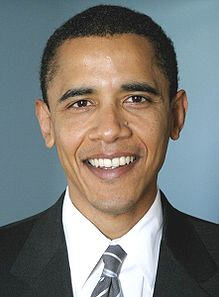
Just under three weeks from now, Barack Obama takes office as the 44th president of the United States. When he does, he'll face enormous problems and challenges. But will those challenges deflect much attention from sub-Saharan Africa?
Professor David Shinn of George Washington University is a former US ambassador to Ethiopia. He spoke to VOA English to Africa Service reporter Joe De Capua about the importance of the continent on the Obama agenda.?If looked at in isolation it's very important. However, putting it in the context of all of the other crises around the world today, not the least of which is our own internal economic crisis, it does not loom very large ? the continent as a whole or the individual problems that exist there. But I think the administration will determine relatively early?that the complexity of the issues that do exist in Africa ? the Congo, Sudan, Somalia, among others ? are going to require it to give a great deal of attention at least at the second tier level of government, not necessarily at the presidential level,? he says.
Explaining the second tier, Ambassador Shinn says, ?Basically, from the heads of various departments ? the Department of State, the Department of Defense ? on down through their deputy secretaries, under secretaries, assistant secretaries ? some attention's going to have to be paid. But I suspect that the president himself is going to be so wrapped up in other key international issues and the economic crisis that he will have relatively little time, if any, to spend on African issues initially.?
Asked whether veteran government officials are already in place to handle African issues, Shinn says, ?That's an interesting question. Whenever you go through a transition, it's always a difficult period because you normally have placeholders in all of the government departments, who are effectively senior career officials, because all of the political appointees normally disappear from the previous administration. Of course this will be a little different this time because Secretary Gates is staying in place at the Defense Department, although those under him, the political appointees under him, may depart. But at the State Department it will be pretty much of a complete changeover at the top level. And whenever you have that situation, my experience has been that even senior bureaucrats are a little reluctant to make significant policy decisions, unless they've been given the go-ahead by the new incoming administration. And that normally doesn't happen. Only after their political appointees have been put in place are you likely to get real policy direction. And that will always take some time because people have to be approved by the Senate, or at least most of them do.?
Are African nations expecting too much from an Obama administration because of his Africa roots? He says, ?I think probably that is true. I think there's an enormous enthusiasm for the new president in Africa. And well deserved. At the same time, the Africans must understand the enormity of the issues that are facing the United States, both domestically and internationally. To some extent they're going to have to wait in line for attention at the senior most level.?
Shinn expects it may be March or April of 2009 before all the new Obama appointments are in place and ready to deal fully with African issues. However, he does say Mr. Obama appears to making appointments faster than usual in such circumstances.
From an African viewpoint, Professor Shinn says, ?One concern will be refocusing the general approach to Africa by the new administration, relying less on just a counter-terrorist concern and more on issues of equity on the continent, better trade opportunities, in spite of the fact we have the Africa Growth and Opportunity Act (AGOA), which could be very important to Africans. It hasn't perhaps lived up to expectations. But I think there will be a desire for more listening to their concerns, less American concern about security issues on the continent, a greater willingness to engage in meaningful conflict resolution. That's always a tough one because there are a number of ongoing conflicts. Most of them have proven to be rather intractable.?He believes African nations will want to see such Bush Administration programs, such as PEPFAR (President's Emergency Plan for AIDS Relief) and the Millennium Challenge Account, continue.
As a former diplomat, Shinn says diplomacy will be ?critical? for the new administration. ?I think they recognize that?. Reaching out, talking to people, even those that you don't like or those that you have issues with. And I think that the Obama administration, or the incoming team, has clearly signaled that they are going to try that. Now, whether that works in every case or not is problematic. It obviously won't work in every case,? he says.







